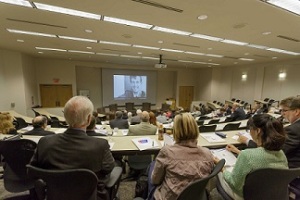Staffing and Training
Your staffing plans for your CIS should include a description of the core staff positions, whether you will have both paid employees and volunteers, and detailed descriptions of the job duties of each staff position. It should also describe your strategies for recruiting new staff members and outline the training that these new staff members will receive.
Jump to:
- Core Staff
- Paid Staff or Volunteer Staff
- Staff Roles and Responsibilities
- Recruiting Staff
- Staff Training
Core Staff
The number of staff you need depends on the kind of service you will be offering, hours of operation, communication channels you’ll be using, and the volume of inquiries you expect. It’s important to remember that text-based inquiries (email, online chat etc.) generally take longer to respond to than phone inquiries so you will need appropriate resources if you plan to deliver a text-based service. To start a CIS, you need at least the following core staff:
- Director/manager: to oversee the service.
- Supervisor: to manage, monitor, and train information specialists, and to provide resources and backup support for them.
- Information specialists: to give accurate information and to provide support for the patient-physician relationship (enough staff to provide coverage during peak call times and lunch hours).
- Information resource specialist: to gather reference materials for your staff to use to help them answer inquiries, or to help design training programs and policies to help staff access appropriate web based materials (this could be a part-time staff member or an information specialist who performs this duty when not answering calls).
Based on the experience of other telephone-based CIS programs, an information specialist working full-time is most effective when spending no more than 4.5 hours per day answering telephone inquiries. This allows the specialist to stay alert and to avoid burnout. In that time, an experienced, trained information specialist can be expected to answer 12-15 calls and complete the needed documentation. Many CIS use a combination of full-time and part-time staff.
Most offices assign other specific tasks to information specialists when they are not answering calls. These can include:
- filling publication orders,
- attending training and continuing education programs
- completing documentation, taking part in work groups
- conducting quality assurance activities, supervising others
- acting as the resource specialist
Paid staff or volunteer staff
A difficult decision to make when starting a program is whether to have an all-paid staff, an all-volunteer staff, or a combination of the two. The main consideration is to ensure that each information specialist is able to offer a quality interaction with each caller. If you are planning to use a volunteer staff of information specialists, you will need to plan on enough supervisory staff to monitor the quality of the service and to provide coverage as needed.
You need to consider the pros and cons of staffing your CIS with paid staff or volunteers. Using volunteers seems to save money at the beginning. However, several CIS programs that have started with a volunteer-only staff to answer calls have found that this approach has limited the growth of the program and that problems arise with recruitment, selection, scheduling and coverage, quality control, training, and delivery of the information. Ultimately, some have found that having volunteers as a majority of the information service staff is not sustainable. Most CIS have replaced their volunteers with paid staff. Volunteers may be used for specified tasks, but the ICISG encourages new cancer information services to consider paid staff instead of volunteers for the job of information specialist.
Staff Roles and Responsibilities
Before recruiting staff it is important to develop clear job/role descriptions. These are important whether your staff is paid or volunteers and include the key skills and abilities that staff will need to perform their role. They are needed so that each member of the team is clear about the key purpose of their role and its boundaries and limitations. A clear job/role description gives you a starting point for developing individual performance objectives for staff as well as something to hold them accountable to if they are not fulfilling their role adequately or have misinterpreted it’s purpose.
Recruiting staff
How and where you advertise for staff and the specific procedures you follow during the selection process will be influenced by legislation, custom and practice in the country you live in. However, the job/role description will be a useful tool in helping to decide what questions to ask during interviewing along with any specific skills you want to test.
| Toolbox! In the CIS Toolbox you will find a set of Sample Interview Questions for Hiring CIS Staff that may be useful when considering your hiring process. |
Choose your interview questions carefully, as the candidate’s answers will be the main indicator as to whether they truly understand what the role is all about. This will avoid problems later on if a staff member is not practicing in the way you need them too or is not staying within appropriate boundaries.
Although some CIS programs are staffed with nurses and doctors, others have found that individuals with a variety of health or science backgrounds can be trained as information specialists. As the job is often difficult and challenging, it is especially important for information specialists to have excellent communication skills and the ability to handle a number of tasks at the same time.
Staff training
A CIS program usually includes three major kinds of training: initial training, continuing education, and specialized training. The goal of initial training is to help new program staff improve communications skills, become familiar with call management and basic cancer concepts, and learn to access the cancer information resources available. Continuing education aims to keep the staff informed of the latest scientific and medical information. Specialized training occurs when a new aspect of the service is to be offered, such as counselling on smoking cessation or clinical trials.
Initial training:
After participating in various content and skill-developing activities provided by the training program, staff should be able to demonstrate the ability to:
- understand the mission, vision, and objectives of the CIS program
- interact objectively, credibly, and sensitively with patients, families, and the public
- provide tailored cancer information to meet the needs and expectations of the callers
- provide referrals to community services as appropriate
- apply CIS policies and guidelines when interacting with callers
- collect reliable program data and complete documentation
Most programs have a series of skill tests that will enable a supervisor to determine when an information specialist is ready to respond to inquiries. These may include completing standardized practice calls and taking written examinations. The testing is designed to evaluate the trainee’s ability to use the equipment and resources, and to meet the callers’ needs and expectations under conditions that simulate an actual call, including:
- performance of basic needs assessment
- use of empathetic listening skills
- provision of correct, tailored information
- identification of appropriate resources
- adherence to stated policies
- offering to mail material
- collection of accurate, complete data
Most programs use a series of training calls. Trainees may practice in pairs, with the supervisor offering feedback on the responses as well as listen to recorded training calls. The next step may be to have the trainee sit with an experienced information specialist, listening in on actual calls. The final step would be for the trainee to take a series of actual calls with the supervisor listening.
Continuing education:
Cancer information is always changing – new research findings, new programs, and new resources. Continuing education keeps the staff informed of these changes. There are many ways to approach continuing education, such as presentations by expert speakers, reading materials, or attendance at lectures. The main objective is to systematically offer and track continuing education for each information specialist.
Along with formal structured training for staff, a good supervisor is always on the lookout for staff burnout and seeks ways to prevent it. Some CIS programs have found that using part-time staff to answer calls helps to avoid burnout. Others debrief information specialists after difficult calls, giving them a little time off to go on a walk or to just relax. Others have psychologists on the staff that look after the emotional needs of information specialists and provide counselling.



